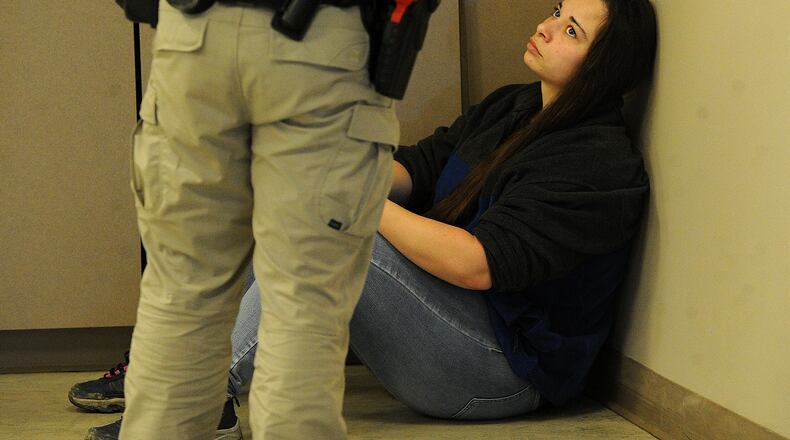Seconds later, voices begin to crescendo from inside the room, the door flies open on the scene of a husband and wife in a full-blown screaming match.
Raquan and I introduce ourselves — in between the actors’ streams of epithets — and separate them. I take the wife with me to the other side of the room, while O’Berry stays with the husband near the door, to try and discover what’s going on. Our job is to break it up, calm them down, and solve the problem.
“Kevin’s not real,” she says. “I’m trying to convince him Kevin’s not real. It’s driving me insane.”
The actors, Chris and Keri Benoit, are married in real life, and are both officers at the Butler County Sheriff’s Office. All of the volunteer officers have day-to-day experience with mentally ill individuals — experience that informs their considerable acting ability.
As she’s talking, I notice a severe wound on her wrist. I go through my questions:
“When was the last time you ate? When was the last time you slept? Do you take any medications?”
In this scenario, both individuals were “pink-slipped” to the hospital, a common disposition for calls like this, and a type of incident that is increasing in frequency across the country.
Police Academy Crisis Intervention Training
On the surface, the classroom curriculum for crisis intervention at Sinclair Police Academy seems pretty straightforward: use active listening skills, ask open-ended questions, secure any weapons and evaluate the situation.
In reality, the first time you walk up on someone with the barrel of a gun in their mouth (even if the gun is blue and obviously fake), any intellectual understanding of the classroom work goes straight out the window.
The Sinclair Police Academy includes 24 hours of crisis intervention training, half of which is classroom time and half of which is practical applications.
In other words, the training is 50% what to do or say when encountering a manic, suicidal or hallucinating person; and 50% being able to remember any of it when your heart rate is up and your palms are sweaty.
“The first scenario I did … I was extremely nervous,” said cadet Chris Jones. “I’m like ‘Okay, here we go, this is supposed to be a real call.’ I couldn’t imagine going to a call on the road for the first time being like … I’ve read a PowerPoint. That’s it.”
Instructors and volunteer officers from several area departments set up a total of six different scenarios on the second floor of building 19 at Sinclair: a man alone in his apartment hallucinating his spouse; a young man in the woods with a shotgun in his mouth; a bickering married couple where the wife has cut herself; an elderly gentleman who just had his water and electricity shut off. Of these, five were single-officer calls, and the married couple called for two officers to respond.
If a crime has been committed, cadets are taught to de-escalate first, and investigate second.
This reporter regretfully committed at least two Fourth Amendment violations inside about two minutes of the first scenario — entering the “residence” without probable cause, for example. Out of 19 cadets and one reporter, no one’s first attempt at crisis intervention went particularly well.
“We get done, we start reflecting with the instructors and everything, and almost everything that we talked about, I’m thinking, ‘I know this. I know how this should have been handled.’ And for whatever reason, I just didn’t,” Jones said.
In between scenarios, the classroom is a flurry of activity: composing scripts, reviewing notes, making our own checklists of things to look out for. Over time, our outcomes improved, and by lunch, several cadets said they learned more in the first four hours of practical scenarios than in the last four days of notebooks and PowerPoints.
“I feel like the high stress that came with it is a good thing, because even though it didn’t go well, I know what I didn’t know. I know what I should fix, not just with these calls, but what I could have done better for any calls across the board,” Jones added.
There are several common ways a mental health call can end. If a crime was committed, the person may be arrested and taken to jail, where in many cases they may receive mental health treatment.
If no crime has been committed, but the person represents “a substantial risk” of harm to themselves or others (including not being able to provide for their own basic needs), the individual may be “pink-slipped,” or involuntarily brought in for a mental health assessment to see if they need to be committed to a hospital.
Interacting with mentally ill individuals has become a fact of everyday police work.
Between March 2021 and September 2022, Dayton saw a 73% increase in mental health calls to 911 and a 111% increase in suicide calls, according to the Montgomery County Behavioral Health Task Force.
About the Author




